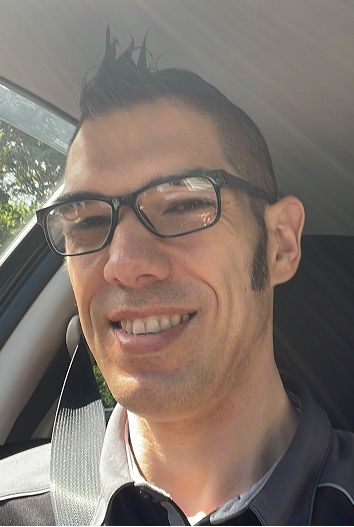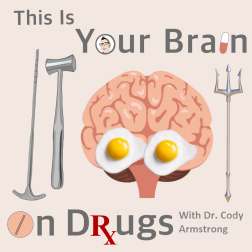
Meet Your Host

Dr. Cody Armstrong attended the University of Texas at Austin where he graduated Suma Cum Laude in 2001 with a degree in Management Information Systems from the McCombs School of Business. He was a member of the Air Force ROTC detachment at the university and went on to serve five years in the USAF as a Communications and Information Officer. He then went back to UT Austin to complete premed coursework prior to attending the University of Texas Medical Brach in Galveston, Texas where he earned his Doctorate of Medicine in 2012. While attending UTMB he again decided to enlist in the military; this time the US Navy. He completed his residency in Psychiatry at Naval Medical Center San Diego in 2016, earning his Board Certification from the American Board of Psychiatry and Neurology in the same year, and went on to serve 8 more years, retiring from the military with 20 years of service. As a board-certified psychiatrist, he served three tours in Okinawa, Japan and finished his service at Naval Medical Center Portsmouth in Virginia.
He has 16 years of medical knowledge and experience in inpatient, outpatient, consult/liaison, and substance abuse psychiatry. He served as an Assistant Professor at the Uniformed Services University of the Health Sciences for four years. He was an attending physician and educated medical students, residents, and fellows in the US and Japan. He taught courses on psychopharmacology and addiction psychiatry and presented numerous grand rounds on these topics. He published four peer-reviewed articles in medical journals and has extensive experience working with patients with PTSD, depression/anxiety disorders, new onset mood and psychotic disorders, and substance abuse disorders. He has great interest in lifestyle medicine and obesity medicine with plans to pursue fellowships in each.
Outside of medicine he enjoys spending time with his children, cooking, traveling the world, gardening, playing ice hockey, and watching Australian Rules Football.

About the Podcast
Podcast Format
This podcast is a labor of love of mine. It's a one man show. I do all the research, production, editing, and website design. My daughters are more artistic than me, so I credit them with the artwork on the show.
The podcast will be delivered in a lecture format where I will cover psychiatric medications in easy, concise, digestibles pearls of everything you need to know about these medications. I plan to cover all psychiatric medications methodically by class to include medications related to mental health symptoms and those used to treat adverse effects of these medications. I will be concentrating on pharmacology but will provide background on the disorders that they treat. I plan to also have update episodes periodically where I share new information or corrections to past information as well as answer listen questions. In addition to the podcast, I will have episodes on YouTube with the same audio but with accompanying slides. These slides will be available for free on this website. In addition I have an Instagram channel (@punk_rock_psychiatrist) where I will share lifestyle medicine clips from my real life in hopes of inspiring you all of non-pharmalogical ways of tackling mental illness. I may also share clips on TikTok (@punk_rock_psychiatry).
Podcast Philosophy
This podcast follows my personal philosophy of the punk rock ethos.
Non-conformity and anti-authority: This means not doing things just because others are doing it. Questioning everything and thinking critically. Its about doing what's right and truthful even when it may not be in your best interest, and for me it hasn't been many times.
Anti-coporate greed: This means that on all my content, you should never see an ad, sponsorship, or influence from pharmaceutical or any corporations. It's important to me that I bring you this content free from any influence and that I'm not used as a tool by greedy corporations to send you their message, whether its obvious or subtle.
Anti-consumerism: This means that I will not be selling you anything. No merch, no books, no study guide, no premium content no self-enrichment of any kind. This is an equal space. Everyone will have free access to this information. I may attempt to offer CMEs at some point, but probably not because its fairly difficult, but if I do, it could cost me a lot, so I may have to in that circumstance charge you at cost for the service. However, all other costs associated with running this operation are on me. Your welcome!
DIY: This means that I'm operating this whole thing solitaire. The only help I get is from my daughters doing the art and feedback from friends, family, and you all on how to make it better. So don't expect the most polished and professional product. I've watched a lot of YouTube videos on how to do all this stuff and I have a background in Information Technology, but this is not my profession, so I'm making it the best I can.
So what's the catch?: You may be asking yourself then why would I do this if I don't plan to make a lot of money. It takes a lot of time and effort, and you're right, it totally does. Shouldn't we be paid for our work. Right again. We should. But I have gotten paid for the last 20 years and I get a nice military retiree pension, so this is on me. I love to teach, and not everything is about money. Giving to others is way more rewarding than getting stuff. My reward is you listening, and hopefully the information here will improve, or even, save some lives.
Why the focus on drugs?: Good question. Well, that's because it's what I know best. I'm actually more about lifestyle changes, therapy, and taking drugs off than adding them, but as an intern I found psychiatry very abstract and overwhelming. I'm more logical minded, and I just found myself understanding the meds much better. I also noticed that most people seemed to focus on the other stuff and not learn the meds so well, so I was like, hey, this could be something that I could use to distinguish myself. So, I've been collecting this information since 2012, and I've got a lot of it. I thought about trying to make it into a book or something since it took probably thousands of hours to put together, but that's just too much of a headache. I'd much rather let everyone have access to it. So, I know the drugs better than I know anything else and I'd like to think better than almost anyone else, and I want you all to know this stuff too, so that we can get better outcomes with our patients. I don't want you to be afraid to use certain medications that maybe you're afraid to use, and I want you to be afraid to use medications that maybe you should be.
Target Audience
I want this to be a place for everyone. Learners, those looking for a refresh and updates, medical folks from all walks of life, and those taking or potentially taking these medications. I hope that you all find this easy to understand and listen to.
1) Medical Students
2) Residents from psychiatry and beyond
3) Physicians of all specialties
4) Nurse practicioners
5) Physician assistants
6) Pharmacists
7) Those affected by mental illness
8) Anyone and everyone that is interested in learning more about how these oft demonized drugs work and how they should be properly used
Information Sources
So, where exactly do I get all my information? Well, a lot of places, and I have to apologize because over the last decade plus that I've been doing this I haven't done a super good job with citation. I only intended to use this information for myself, so I figured, why should I cite everything as I find it? Well, I wish I had, but in many cases I'm asking you to trust me, but feel free to verify. I'm sure if you search for this stuff, you'll find it where I found it, and once you are satisfied that my information is solid, then hopefully your trust will grow. Also, I welcome feedback. I'm an open book and I miss things all the time, so I'm constantly updating my stuff and it would be great to have your help with that. I also want to make clear that I believe in the scientific method and in evidence-based medicine, though I understand its flaws as well, but in my opinion its the best we have. I'm not someone that believes in things because they sound good or make me feel better. I need evidence, and that comes from a combination of scientific research and clinical experience.
So these are the places I get my info:
1) Lectures from my education and residency
2) Journal articles of scientific research
3) Expert opinion from places like UpToDate
4) My own personal research and clinical experience
5) My own personal experiences (I guess its something from psychodynamic therapy training that I actually remember; that my own experiences influence my interactions with patients and just about everything else!)
6) And as our relationship grows, listener feedback
7) Also I want to do something I don't think any other podcasts are doing and shout out to all the great podcasts that have helped me improve my knowledge and continue to do so, so I'm going to plug these without their knowledge, so I hope they appreciate the endorsement! And these are in alphabetic order so I'm not saying any are any better than any others.
The Carlat Psychiatry Podcast
Cracking Addiction
The Curbsiders Internal Medicine Podcast
The Docs Who Lift Podcast
HelixTalk (pharmacist podcast)
Hidden Brain
Longevity by Design
The Mind Gut Conversation Podcast
NEI Podcast
Psychiatry & Psychotherapy Podcast (Big shout out to Dr. David Puder for the encouragement and advice!)
Psychopharmacology and Psychiatry Updates
Real Life Pharmacology
Where Should We Begin?
Difference from Other Podcasts
So, I just gave a shout out to all the podcasts that I recommend you listen to if you are interested in topics of mental health and pharmacology, but what sets this podcast apart? I mean if you can just listen to all of those, then why do we need another me-too podcast out there saying the same stuff?
Well, if that's what I thought I was doing here, then I wouldn't be doing it. Here are some of the things that I think makes this place special.
My philosophy: I talked about this above. I've affectionately dubbed myself the punk rock psychiatrist for a reason. I've always been a fan of the music and tried to espouse its principles, and I know a lot of you are probably thinking, "I don't want to take advice from a 40 something guy with a mohawk that listens to punk rock and still wears puffy circa-1995 skate shoes. That crap is loud and disrespectful." Hey, well it may not be your taste in music, but I think you will find the philosophy to be one that we can all appreciate. That means that I'm my authentic, irreverent self on this podcast. I'm not the 20 year military veteran that you are expecting. I'm raw and real, and I hope that comes across, and I hope its something that you connect with. I still wear those skate shoes on the ward, and I can tell you that my patients by and large appreciate it. Maybe they are expecting a stuffy doctor in a tie, but that just ain't me.
Noncommercial nature: As I said above, I will not be charging you or taking money from anyone that is paying me to sell you ontheir drugs, so I hope you enjoy the ad-free content and lack of industry sponsorship.
Organized format: When I listen to a lot of podcasts, they seem more like discussions, which can be great, but do they really put it all together for you? Do they follow an organized and systematic approach to teaching material? I don't really think so, so I think that's where I stand out. I want you to be able to easily and quickly find the content that you want and after listening to it, I want you to be able to safely and effectively prescribe, deprescribe, or not prescribe the medications I will discuss. I want those of you out there that aren't in mental health to be able to prescribe psychiatric medications, and I want you psychiatrists out there to be able to prescribe non-psychiatric medications. And for those of you that don't prescribe, I want you to be better informed, so that you can go to your doctor and ask the questions that are going to meet your goals for treatment as best as possible.
What's that? Prescribe outside my specialty???: I see this all the time. Patients come to me and say that their doctor told them that they can't prescribe them something so they sent them to me. It's not that we can't, it's that we don't know how, don't want to, or don't have the time to learn how to. Well, you've come to the right place. And I know what you're thinking, "yeah right, I'm not risking my license doing something I shouldn't be doing." But wait a second. When you take care of patients on inpatient, you have to manage all of their medications. You can't be calling the specialist for every medication on their list. And you need to know about drug-drug interactions because you may be prescribing something that interacts with something someone else is giving them and vice versa. You also may be asked to treat a symptom that is caused by another medication that they are taking and so it would be a mistake to just add something else on top. Also, how long will it take before they can even see another doctor? Maybe too long. Maybe never. You may be the only one that can help them. I can tell you from personal experience that I pretty much never tell a patient that I can't do something, and I've never had a bad outcome. If you know these medications down pat then you can feel confident and treat the whole person. You know the old problem where you send a patient to a cardiologist and they get a cardiac med. You send them to a GI doctor and they get a GI med. Well if you send a patient to me, I first assume its not psychiatric. I rule everything else out in my mind first before I tack on another medication, and if I think it's something else, I'll order the lab or give a trial of treatment with what I think the problem is before I jump to sitting in my own sandbox. I hope after listening to my show that you feel more confortable doing the same!
Copyright ©2026 This Is Your Brain On Drugs Psychiatry Podcast, All Rights Reserved.